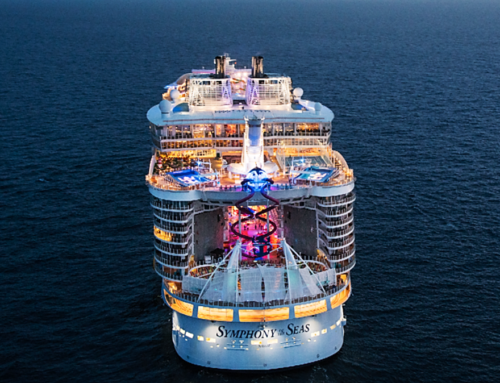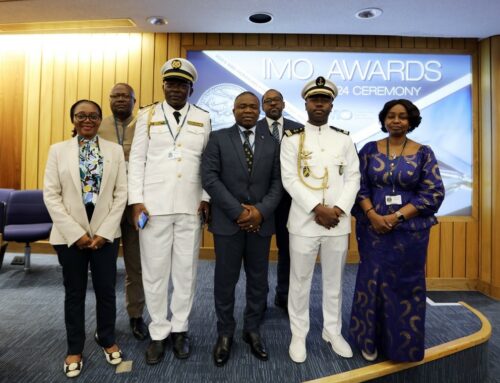Deep Waters, Dark Secrets: The Cost of China’s Supremacy on the High Seas
 The vast expanse of the world’s oceans has experienced a titanic shift, largely unseen, but profoundly impactful. China, a nation historically tied to the land, has now claimed dominance over the seafood industry. This dramatic transformation, chronicled meticulously by the Pulitzer Center and The Outlaw Ocean Project, reveals a saga of ambition, innovation, and controversy. China’s ascent to become the world’s undisputed seafood superpower is a story that intertwines economic prowess with pressing global issues of human rights, as well as environmental sustainability.
The vast expanse of the world’s oceans has experienced a titanic shift, largely unseen, but profoundly impactful. China, a nation historically tied to the land, has now claimed dominance over the seafood industry. This dramatic transformation, chronicled meticulously by the Pulitzer Center and The Outlaw Ocean Project, reveals a saga of ambition, innovation, and controversy. China’s ascent to become the world’s undisputed seafood superpower is a story that intertwines economic prowess with pressing global issues of human rights, as well as environmental sustainability.
China’s ascension to the position of the world’s leading seafood superpower is a tale of rapid expansion, technological advancement, and strategic global influence, albeit shadowed by human rights violations and devastating environmental impact. Over the past few decades, China’s fishing industry has undergone a remarkable transformation, expanding from a modest catch of 198 million pounds of seafood in 1988 to an astonishing five billion pounds by 2020, as reported by The Outlaw Ocean Project. Behind these impressive statistics lies a complex web of geopolitical maneuvers, as well as human stories. China’s fishing fleet, the largest and most expansive in the world, is more than just a commercial armada; it’s a potent symbol of the country’s global aspirations and its willingness to wade through murky ethical and environmental waters to achieve them.
As this deep-sea narrative is explored, many layers are uncovered that explain why China is the colossus of the oceans — from its sprawling fleet and international port dominance, to the controversial labor practices and environmental impacts. This is not just only about the seafood on our plates; this is vital to understand the political and economic currents of power, ambition, and resilience that flow beneath the surface of our global seas.
China and its Seafaring Strategy
This expansion is a direct result of China’s strategic investment in the industry, including the construction of processing plants, cold-storage facilities, and fishing ports, both domestically and overseas.
This growth has been fueled by the global appetite for seafood, which has increased fivefold over the past 50 years. To meet this demand, China has deployed a vast distant-water fishing fleet, estimated at around 6,500 ships, significantly outnumbering any global competitor. These ships operate globally, with China now running terminals in over 90 ports worldwide. This maritime prowess has extended China’s influence in coastal countries in South America and Western Africa, leveraging seafood trade for political loyalties.
Technologically, China has leveraged advances in refrigeration, engine efficiency, hull strength, and radar. Satellite navigation has revolutionized the industry, enabling longer voyages and more extensive fishing operations. This technological advancement, combined with a fierce competitive spirit and substantial capital, has positioned China at the forefront of the global seafood industry.
Indebted, Enslaved, and Abused: The Plight of Fisherman at Sea
However, this dominance has raised concerns regarding labor rights and ocean conservation. China’s distant-water fleet is notorious for human rights abuses. Investigations have revealed widespread abuse, with many crew members reporting experiences of physical violence and many types of exploitation. These conditions are particularly dire on Chinese squid ships, which are also implicated in a significant portion of the world’s illegal fishing activities.
Violence and Neglect at Sea
 One of the most alarming aspects of the international fishing fleet is prevalence of debt bondage and human trafficking. Investigations by the Environmental Justice Foundation and reports from The Outlaw Ocean Project revealed that a significant majority of Indonesian crew members on Chinese vessels have experienced some form of debt bondage. This practice involves trapping individuals in a cycle of debt that they cannot pay off, effectively enslaving them. Crew members also have reported confiscation of their wages and vital documents such as passports and birth certificates. Additionally, crew are often forbidden access to a phone or the internet, making it nearly impossible for them to leave the ship or seek help.
One of the most alarming aspects of the international fishing fleet is prevalence of debt bondage and human trafficking. Investigations by the Environmental Justice Foundation and reports from The Outlaw Ocean Project revealed that a significant majority of Indonesian crew members on Chinese vessels have experienced some form of debt bondage. This practice involves trapping individuals in a cycle of debt that they cannot pay off, effectively enslaving them. Crew members also have reported confiscation of their wages and vital documents such as passports and birth certificates. Additionally, crew are often forbidden access to a phone or the internet, making it nearly impossible for them to leave the ship or seek help.
Physical violence and criminal neglect also are rampant on such fishing vessels. The Environmental Justice Foundation found that a substantial percentage of Indonesian crew members reported witnessing or experiencing physical abuse. Crew members often work in inhumane conditions, with workdays extending up to 15 hours and minimal rest. Taking a day off for any reason, if even possible, results in exorbitant wage deductions. Access to medical care is limited or non-existent, and injuries, malnutrition, and illnesses are common. It is not uncommon for severely injured seamen to be denied access to medical care for extended periods, or even indefinitely.
Forced Labor: The Uyghur Dilemma
On land, China’s seafood processing plants have become sites of significant human rights concerns, particularly involving the forced labor of Uyghur workers. The Chinese government has been forcibly relocating Uyghurs to work in these factories, as documented by The Outlaw Ocean Project. This practice has drawn international condemnation, with the United Nations and the International Labor Organization expressing deep concern over China’s labor policies in Xinjiang, which appear to be coercive in nature.
A Cry for Help
Stories continue to emerge of crew members held captive on Chinese fishing vessels. The Ocean Outlaw Project employed a “message in a bottle” technique, tossing bottles fastened to small buoys with questionnaires inside aboard vessels for the crewmembers to fill out, and toss aside to be collected and read later. This allowed the crew to answer more freely and honestly about the conditions they faced working (or sometimes, effectively enslaved) aboard these vessels. This is not a novel technique, however; many bottles with messages indicating workers in distress have been found before. Recently, such a bottle washed ashore in Uruguay, sent by a desperate crew member of a Chinese squid fishing vessel pleading for help. It read:
“Hello, I am a crew member of the ship Lu Qing Yuan Yu 765, and I was locked up by the company…When you see this paper, please help me call the police! S.O.S. S.O.S.”
Although the owners of the vessel have since claimed this was a hoax, this incident, which was also reported by The Ocean Outlaw Project, is a chilling testament to the helplessness and isolation experienced by many workers in this industry.
The Uyghur Dilemma
Moreover, China’s approach to labor in its seafood processing industry has come under scrutiny.  The government has been forcibly relocating Uyghur workers to seafood processing plants, raising concerns about coerced labor and human rights violations. This practice extends to the use of North Korean labor in Chinese factories, further complicating the ethical landscape of China’s seafood industry.
The government has been forcibly relocating Uyghur workers to seafood processing plants, raising concerns about coerced labor and human rights violations. This practice extends to the use of North Korean labor in Chinese factories, further complicating the ethical landscape of China’s seafood industry.
The Seafood Industry and Geopolitics
The international community has expressed concern over China’s general lack of responsiveness (and respect) towards regulations and transparency regarding its fishing practices. This situation is particularly problematic, given that the demand for seafood in the U.S. has risen dramatically over the past several decades, and the large majority of this is caught or processed by China. This economic development makes it challenging for companies to ensure their products are free from illegal fishing practices or human rights abuses. China does more illegal fishing than any other country, according to the Transnational Organized Crime. As there is near to no law-enforcement presence, fishing in forbidden regions is common, as well as using prohibited techniques to gain a competitive advantage. Accounting for over a fifth of the international seafood trade, this aggressive fishing comes at a severe environmental cost. Presently, a third of the world’s stocks are overfished.
China’s overwhelming dominance in this industry has also created a power imbalance, raising alarms among political analysts, navy analysts, and ocean conservationists. China’s use of its fleet for geopolitical ambitions, coupled with its demand for sensitive port tracking information, and active invasion of other countries’ waters, is seen as a threat to global food security and international law. Military analysts have long suspected China uses its fishing fleet to conduct surveillance; the Center for Strategic and International Studies found the Chinese government offers a daily sum roughly $4,500 to the owners of fishing vessels to stay in contentious maritime regions for the majority of the year. Satellite imagery from previous years revealed that a significant number of these ships engaged in illegal fishing activities in Taiwanese waters, with around two hundred vessels located in the contested areas of the South China Sea. These ships play a critical role in what a recent study by the Congressional Research Service describes as “‘gray zone” operations,” which involve coercive tactics that stop just short of outright warfare. Their activities include accompanying Chinese hydrocarbon exploration vessels, delivering supplies, and hindering or outright blocking the operations of foreign ships.
While China’s rise as a seafood superpower has been economically and strategically successful, it has also brought to the fore critical issues of labor rights, environmental sustainability, and global power dynamics. The story of China’s seafood industry is a complex interplay of economic growth, technological prowess, and geopolitical influence, marred by significant ethical and environmental challenges.
We at the Herd Law Firm are proud to fight for maritime workers and passengers in all types of personal injury claims. As Houston maritime attorneys, we never waver in our commitment to help these maritime workers and their families when they are injured.
Read more in the Pulitzer Center’s Report here: China: The Superpower of Seafood | Pulitzer Center
12/12/2023
Image credit: The Outlaw Ocean Project







